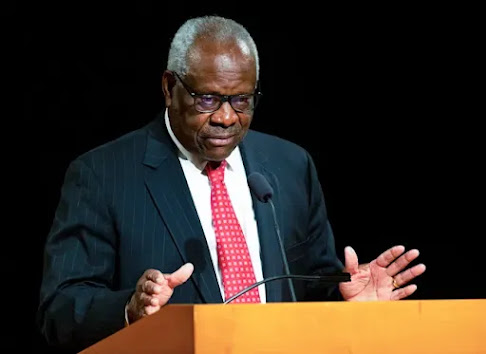WASHINGTON − Harlan Crow, the Republican donor who feted Supreme Court Justice Clarence Thomas with luxury travel and other gifts, is rebuffing an effort by Senate Democrats to look into those exchanges.
"We have serious concerns about the scope of and authority for this inquiry," Crow's lawyer, Michael Bopp, wrote in a letter to Senate Finance Committee Chairman Ron Wyden, D-Ore. "As you are aware, the committee's powers to investigate are not unlimited."
The letter was a response to a request last month by Wyden for more information about the gifts and whether they implicate the federal gift tax. The response suggested Crow would also fight a congressional subpoena, if one was issued, noting that Congress can only make such demands for a "legitimate legislative purpose."
The letter underscored the challenge Democrats in Congress are likely to face as they look for a legislative response to the ethics scandal unfolding just across the street at the Supreme Court. Debate over Thomas has devolved into a partisan fight, with Democrats demanding more information and most Republicans brushing the revelations aside.
Chief Justice John Roberts declined an invitation to testify before the Senate Judiciary Committee. The court issued "statement of ethics principles and practices" that defended current practices and has otherwise remained silent.
The back-and-forth follows a series of ProPublica stories last month that identified luxury trips Thomas accepted from Crow, including international travel. Another story documented property Crow bought from Thomas and members of his family. Crow also paid for the private school tuition of Thomas's grandnephew.
"The assertion that the Finance Committee lacks a legislative basis for an investigation of the abuse of gift taxes by the wealthy is simply preposterous," Wyden said in a statement Tuesday. "The bottom line is that nobody can expect to get away with waving off Finance Committee oversight, no matter how wealthy or well-connected they may be."
In response to the initial ProPublica story about the travel, Thomas last month said he was "advised that this sort of personal hospitality from close personal friends, who did not have business before the court, was not reportable."
"I have endeavored to follow that counsel throughout my tenure," Thomas said in a statement, "and have always sought to comply with the disclosure guidelines."
Explainer:Do past Supreme Court cases offer clues about how the justices view ethics, transparency?
Code fix:Would a code of ethics fix the Supreme Court? Some raise concerns about enforceability
"The timing of and context surrounding the Letter point to a different purpose," Crow's attorney wrote. "Given the Letter’s timing and focus, this inquiry appears to be a component of a broader campaign against Justice Thomas and, now, Mr. Crow, rather than an investigation that furthers a valid legislative purpose."

